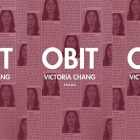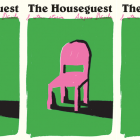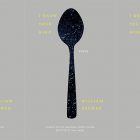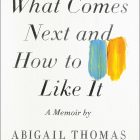The Wilderness of Language in Atsuro Riley’s Heard-Hoard
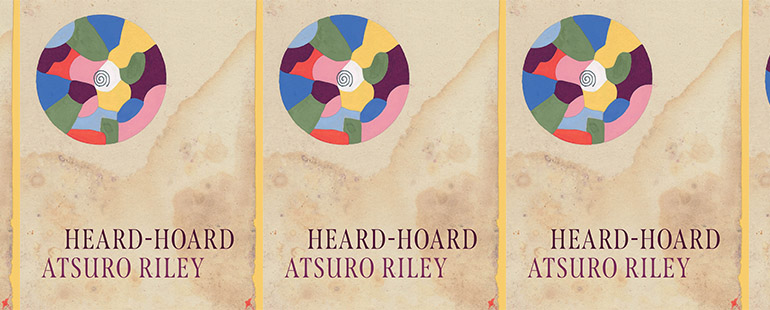
Heard-Hoard
Atsuro Riley
University of Chicago Press | October 6, 2021
Atsuro Riley’s second full-length poetry collection is an onomatopoeic potpourri. In it, language, like nature, is elemental—a way of speaking and being in the world. Reminiscent of Edgar Lee Masters’s Spoon River Anthology as Gerard Manley Hopkins’s poems, the collection calls us back to the roots of language, breaking it apart and putting it back together. Riley’s inventiveness is an invitation to notice language’s connection to the natural world, both equally complex and beautiful.
To this end, Riley starts by revisiting the origins of language in our desire to communicate stories. In one of the first poems, “Call,” Riley creates a lore-like exploration of how people share stories. “It starts with the lamp that lamped our night our dirt,” the poem begins. The feeling is one of being gathered around a campfire ready to not read but hear story:
The story-man encircling us binding us by lard-torch and ditty.
So.
In the beginning.
And it came to pass.
Wait’ll I tell you.
Tale-flicker from his crackling throat . . .
In this poem, language is tangible—something we can taste, see, and touch. Lines like “For darkling green; / for thorn surround. // This absorbing / quaggy / crample-ground” show not only the beautiful blend of consonance and assonance in Riley’s word choice, but also the beauty of the roots of the English language. In yoking some of his words, Riley makes his experimental form and flow of language feel like something from Anglo-Saxon literature. And indeed, the vocabulary in this collection includes many Anglo-Saxon-based words that heavily shaped the Old English lexicon. The result is a more “earthy” vocabulary, spoken by people whose lives were bound to the land. Riley’s word choices bring us closer to the natural world.
Just as Riley utilizes language to forge a connection between humans and the landscape, the stories unfolded in this collection further this inextricable connection. In “Clary,” we meet a woman who pushes a cart made from an oak tree: “Comes Clary by here now / Body bent past bent. Intent upon horizon and carry.” She has a “null eye long since gone isinglassy, opal.” Like a body of water, her presence surges through town: “Courses Clary sure as bayou through here now / Bearing (and borne ahead by) hull and hold behind her.” In “Oak,” readers meet the precocious, imaginative Tammy: “Being she herself was (wildling) (loosestrife-weed) / (undaddied) same as us . . . //she saw to tell us time and time that yonder oak its bark and bulk.” In each story, the land has marked the people the speaker introduces to us; language turns to the trees, plants, and bodies of water in order to describe the human bodies that live beside and within these natural spaces.
While humans share space with nature in many of the poems, in others, nature takes over, as in the poem “Creekthroat,” where a creek speaks: “By hook or by bent / I guttle the rudimental stories.” Nature, like humans, is always speaking, always telling stories. The creek speaks of need: “This old appetite as chronic as tides— / on foot or by boat at night (please) slake me with radicle stories.” The word “radicle,” is a key. These stories are bound to the ground, and thus nature teaches humans about needing to be rooted, to be connected to something that came before.
To this theme, the last poem, “Thicket,” is rooted in a variety of literary voices. Riley interweaves the words and vocabulary of poetic influences like Seamus Heaney, Gerard Manley Hopkins, and Amy Clampitt, as well as novelist and British prime minister Benjamin Disraeli. In this poem, “We come gnawed by need on hands and knees . . . / For darkling green; for thorn-surround.” The thicket contains abundance, and paradoxically, offers us the space to unburden ourselves: “Leafwhelmed in here . . . / We grasp to suck to taste what light. / Let loose the bale that bows us down. / —Bow down.” Many of the lives unfolded in this collection are underscored by want or need of some sort of what came before. “Thicket” suggests that in nature there is both an echo of and balm for the aching human heart, and that we as humans have a need for nature, to return to our roots.
Heard Hoard explores this need through language, and its lyricism is underscored by its form. There is an abundance of white space, irregular line lengths, and different line alignments that remind of the wildness of nature itself. The collection reads like a play of sorts, with urgency that demands the work be read aloud, the rhythms to be said, to be sung. In the song, we hear nature offer us another way to know the world, allowing us to better know ourselves as fractured, fractaled, multi-faceted beings, as complex and beautiful as language itself.
